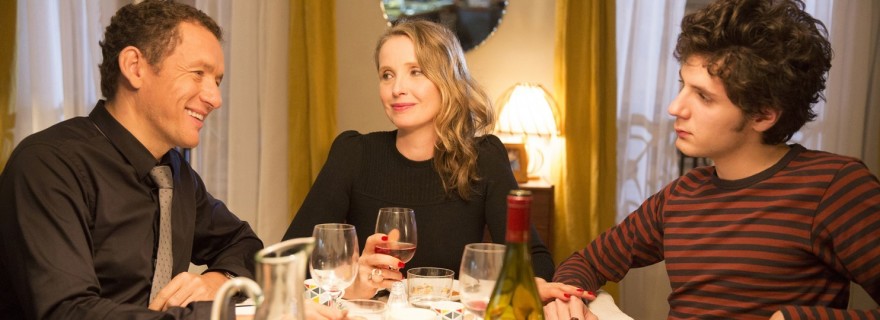'Lolo'
Movie Rating:
2.5
‘Lolo’ is a curious creation. The sixth directorial effort from actress Julie Delpy never quite finds a consistent tone. It’s a comedy, certainly. The movie makes great efforts to ensure that at least one person laughs. However, the story wavers between the relatable and the absurd so willy-nilly that it’s hard to ever pin down and get invested.
Presumably, that was deliberate. Delpy hoped to defy expectations and avoid predictability by frequently shifting comedy genres within scenes. However, something about the final result feels a little too lumpy, even if a variety of scenes and sequences throughout have genuine laughs, poignancy and clever ideas.
Delpy stars as Violette, a neurotic forty-something single mother with horrible luck in love. During a trip to the country with her lovingly pushy best friend (Karin Viard), she’s essentially forced into bed with a cute country bumpkin named Jean-René (Dany Boon from ‘Micmacs‘) who drops a tuna in her lap. It ends up working better than both expect. When it turns out that Jean-René is planning to move to Paris for a big bank IT project, Violette is even excited to continue the relationship.
There’s a problem, though. Violette has a 20-year-old son named Lolo (Vincent Lacoste) who’s a biiiiit of a nutcase. For years, he has secretly ruined his mother’s relationships to keep Violette all to himself and sees no reason why this new dummy shouldn’t be his next victim. He schemes, doing everything from offering poor fashion advice to covering clothes with itching powder, before gradually growing his plots in scale and insanity. The only catch is that Jean-René won’t be as easy a victim as the kid is used to. In fact, this just might turn into a fight.
‘Lolo’ is a weird dark comedy about a twisted son and unhealthy maternal relationships – not that you’d know that at first. For the first 20 minutes or so, the movie plays like a charmingly awkward, sincere and vulgar middle-aged rom-com in keeping with some of the filmmaker’s previous features. The dialogue sparkles with harsh truth. The foundation of the Violette/Jean-René relationship is believably vulnerable while still consistently funny. It all works rather well and plays as a sweet culture-clash love story until the title character is introduced. At that point, it’s as if Delpy hit the Reset button, like she had started writing one screenplay, got bored, and went for another. It’s jarring, especially when the second movie proves to be so tonally different.
It’s worth noting that Vincent Lacoste is pretty excellent as Violette’s sociopath offspring. He plays possum as the “too cute to be crazy” kiddie for a bit, and as immature as his early pranks and disturbances seem, they’re at least credible within the world that Delpy has established. However, when the kid goes big, the movie starts to fall apart. There’s nothing remotely believable about the biggest sabotage plots that Lolo kicks off, which typically devolve into tedious slapstick that ruins any sense of reality the movie once held. Delpy includes a few clever meta gags (like the couple watching ‘Village of the Damned’ unaware that they’re essentially starring in their own version of that movie) which suggests she’s striving for a heightened movie-movie atmosphere. There’s nothing wrong with that, necessarily. It just doesn’t really suit her strengths as a storyteller. The subtle stuff works best here, and the second half of the film has little time for subtlety.
By the time the movie rolls around to its plot revelations and message-making, ‘Lolo’ can become downright grating in how hard the filmmaker hits her nails on the head. It’s kind of sad to watch the whole thing fall apart, especially since many of the broadest gags suggest that she was attempting to reach a wider audience with that material. Still, enough here works, and the central idea is strong enough that it’s hard to completely write off ‘Lolo’. If nothing else, Delpy is a great actress who somehow pulls off her character’s most absurd moments with a certain understated grace that shouldn’t be possible. She just doesn’t quite have that ability as a filmmaker. The movie includes some fantastic scenes and gags in its back half, but it doesn’t quite hit the sweet spot found in the first half. This could have been a quite fun comedy rather than a frequently frustrating one.




Crewcrusher
Who the hell gave Julie Delpy SIX tries at directing when Whit Stillman (Director of the BEST REVIEWED movie of the summer: Love and Friendship) has to work for 12 years to get his next movie up and running? Sexism in Hollywood? What canard.
Josh Zyber
Neither of those movies was made in Hollywood.
Julian
I absolutely adore Julie Delpy, and I think Dany Boon is a very funny man (check ‘Bienvenue chez les Ch’tis’).